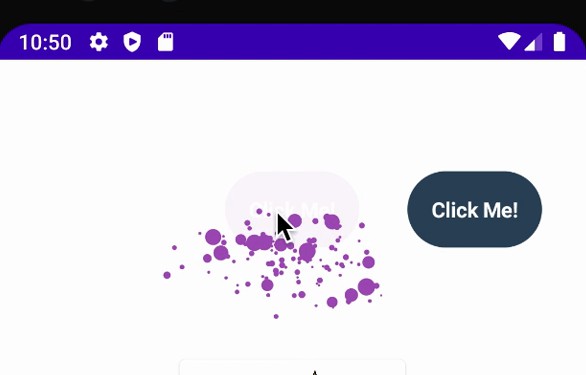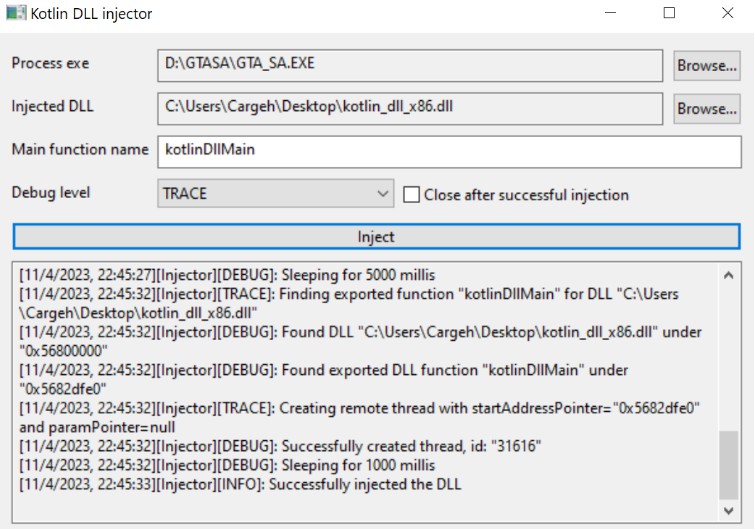Kinzhal
Kinzhal is a Kotlin Multiplatform library for compile-time dependency injection. The goal is to emulate basic features of Dagger to achieve similar experience in Kotlin Multiplatform projects
Kinzhal is based on Kotlin Symbol Processing (KSP) — the API for lightweight compiler plugins. You’ll need to set up KSP in your project to use Kinzhal
Setup
Add KSP to your plugins section:
plugins {
id("com.google.devtools.ksp") version "1.5.30-1.0.0"
kotlin("multiplatform")
// ...
}
Apply Kinzhal KSP processor:
dependencies {
ksp("com.daugeldauge.kinzhal:kinzhal-processor:$kinzhalVersion")
}
Add compile-only kinzhal-annotations dependency to your common source set:
kotlin {
sourceSets {
getByName("commonMain") {
dependencies {
compileOnly("com.daugeldauge.kinzhal:kinzhal-annotations:$kinzhalVersion")
// ...
}
}
// Optional workaround for intellij-based IDEs to see generated code. This probably will be fixed someday in KSP plugin.
// You can replace `jvmName` with any of your target source sets. After the source set is built IDE will start to recognize generate code
if (System.getProperty("idea.sync.active") != null) {
kotlin.srcDir("$buildDir/generated/ksp/jvmMain/kotlin")
}
}
}
FAQ
What does kinzhal mean?
It’s a russian word for dagger. Yes, K is not a pun
Will this project become deprecated after Dagger releases support for KSP and Multiplatform?
Probably. But we’ll see
What targets are supported?
JVM and most of Kotlin/Native targets. Kotlin/JS is not supported for now (see #4). Please file an issue if you don’t find a target you need
Examples
@AppScope
@Component(modules = [
NetworkModule::class,
], dependencies = [
AppDependencies::class,
])
interface AppComponent {
fun createAuthPresenter(): AuthPresenter
}
interface AppDependencies {
val application: Application
}
@Scope
annotation class AppScope
class Application
@AppScope
class Database @Inject constructor(application: Application)
class AuthPresenter @Inject constructor(database: Database, lastFmApi: LastFmApi)
class HttpClient
interface LastFmApi
class LastFmKtorApi @Inject constructor(client: HttpClient) : LastFmApi
interface NetworkModule {
companion object {
@AppScope
fun provideHttpClient() = HttpClient()
}
fun bindLastFm(lastFmApi: LastFmKtorApi): LastFmApi
}
// somewhere in your app
val component = KinzhalAppComponent(object : AppDependencies {
override val application = Application()
})
val presenter = component.createAuthPresenter()
See more in the source code
Dagger2 compatibility table
| Feature | Kinzhal support | Notes |
|---|---|---|
@Component |
✅ | |
| Constructor injection | ✅ | |
| Field injection | ? | #1 |
| Component provision functions and properties | ✅ | |
@Module |
⚠️ | Kinzhal has modules but does not have @Module annotation. All classes in component module list are treated as modules. Only object modules with provides=functions and interface modules with binds-functions are allowed |
@Provides |
⚠️ | Kinzhal does not have @Provides annotation. All non-abstract functions in a module are considered to be provides-functions |
@Binds |
⚠️ | Kinzhal does not have @Binds annotation. All abstract functions in a module are considered to be binds-functions |
@Scope |
✅ | |
@Qualifier |
✅ | |
| Component dependencies | ✅ | Dependency instances are passed to generated component’s constructor instead of builder functions |
@Subcomponent |
? | #3 You can use component dependency to emulate behaviour of subcomponents |
@Reusable |
? | |
@BindsInstance |
? | You can use component dependency to bind instances |
| Lazy/provider injections | ? | #2 |
@BindsOptionalOf |
? | |
| Multibindings | ? | |
| Assisted injection | ? |



